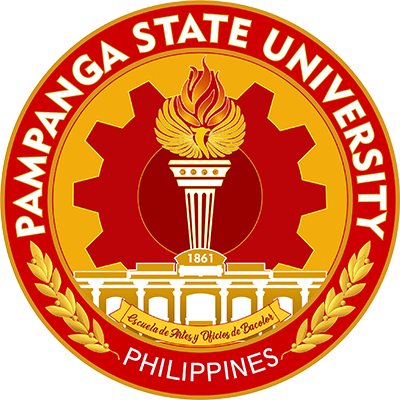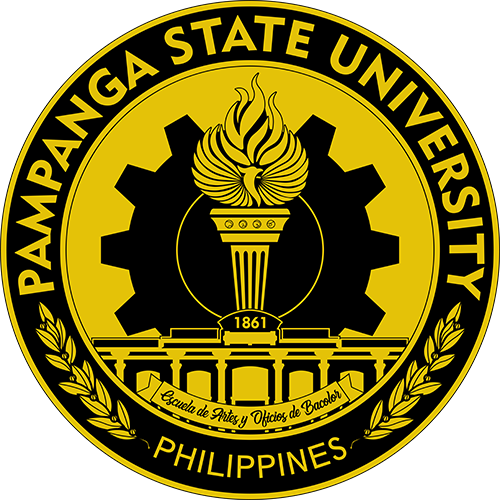HISTORY
One of the mandates of an institution of higher learning like Pampanga State University is to provide relevant quality education to its clientele not only in the province of Pampanga but also to its neighboring provinces in Region III.
In cognizance to its mission of providing access to higher vocational, professional and technological instruction and training, the Bachelor of Science in Industrial Technology was first offered in the school year 1977-1978 when the university was still known as Don Honorio Ventura Memorial School of Arts and Trades under Mr. Olegario N. Lenon as the superintendent. The first batch of BSIT graduated in the school year 1980-1981. The program was phased out when the school was converted into a state college on May 5, 1978 with Mr. Pascual T. Galura as its last superintendent. Mr. Mariano P. Cadiang served as Head of Shop Instruction and later as Dean of the Technical and Technician Department until his retirement in 1990. Mr. Rey Macalino took over for a while as Officer-in-Charge. The official designation of Dean Francio T. Fernandez was from 1990-2009. Under the leadership of Mr. Fernandez, the Evening Opportunity Class (EOC) was offered. The EOC is a pure vocational program provided to cater the needs of working students. It was offered in partnership with the Extension Services initiated under its Director Mr. Ruben Nacpil and continued by its successor, Mr. Romeo Lopez, and Mr. Jacinto Mercado. The program was later under full jurisdiction and control of the College of the Industrial Technology. By virtue of Board Resolution No. 14, s. 1992 BSIT Curriculum was reoffered in 1991 in the Institute of Teacher Education. As a result of curriculum realignment, Bachelor of Science in Industrial Technology was adopted by the Institute of Technical/Technician in the school year 2003-2004. Hence, the renaming of the department into Institute of Industrial Technology by virtue of Board Resolution No. 22, s. 2005.
In alignment with the university’s vision of cultivating equally competent and highly skilled graduates, the College of Industrial Technology offers a Ladderized Curriculum for the Bachelor of Science in Industrial Technology, in accordancewith Executive Order 183. This innovative curriculum features nine distinct specializations designed to equip students with the practical skills and knowledge necessary for success in their chosen fields. The specializations include Automotive Technology, Beauty Care and Wellness, Consumer Electronics Technology, Electrical Technology, Food and Services Management, Garments and Fashion Design, Graphics Technology, Mechanical Technology, and Welding Technology. By providing a diverse range of options, the College ensures that students can tailor their educational experience to meet their individual career aspirations and industry demands.
Moreover, in response to the demands of globalization, the College of Information Technology (CIT) has introduced additional specializations, including Instrumentation and Control Technology, Mechatronics Technology, and Woodworking Technology. These specializations were launched in the first semester of the Academic Year 2022-2023, reflecting the university's commitment to addressing the skills gap in the labor market. This initiative aligns with the principles of Education 4.0, which emphasizes a purposeful approach to learning and aims to transform the educational landscape through the integration of advanced technology and automation.
Furthermore, this educational framework is closely aligned with Industry 4.0, which necessitates that educational systems provide learning experiences that are automated, networked, virtualized, and adaptable to a globalized environment. By embracing these innovative specializations, CIT is not only preparing students for the challenges of the modern workforce but also ensuring that they are equipped with the skills needed to thrive in an increasingly interconnected and technologically advanced world.
Demonstrating its unwavering commitment to providing high-quality education, the Bachelor of Science in Industrial Technology (BSIT) program was awarded the Certificate of Program Compliance (COPC) by the Commission on Higher Education (CHED) on December 1, 2020. In addition, the program underwent a rigorous accreditation process by the Accrediting Agency of Chartered Colleges and Universities in the Philippines (AACCUP), which began with a preliminary survey for accreditation status conducted on March 16, 2009.
Following this initial assessment, the program achieved Level 1 Accreditation on March 13, 2013, which was valid from March 1, 2013, to February 29, 2016. It subsequently attained Level II ReAccreditation, effective from December 1, 2017, to November 30, 2021. Most recently, the program successfully passed Phase 1 of a two-phase evaluation during the 3rd Survey Visit by AACCUP, with the accreditation effective from December 16, 2021, to December 15, 2022. The results for Phase 2 survey of the evaluation are still pending release from the
accrediting body. This series of achievements underscores the program's dedication to maintaining high educational standards and continuous improvement.
Other officials from the College of Industrial Technology (CIT) have played a significant role in the effective management and operation of the program. Notably, Mr. Petronilo Galang served as the Dean of the College from 2009 to 2017, and Mr. Marlon Z. Regala held the position from 2012 to March 2017. Their leadership and dedication have been instrumental in fostering a conducive
learning environment and ensuring the program's success during their tenures.
Finally, since April 2017, Dr. Benigno P. Legamia, Jr. has been serving as the Dean of the College of Industrial Technology. Under his leadership, the college has assembled a dedicated team of faculty members, both full-time and part-time, who are highly qualified and committed to excellence in education. The majority of these faculty members hold Master’s degrees and possess National Certifications (NC III and NC IV), as well as Training Methodology 1. This strong academic foundation and professional expertise ensure that students receive high-quality instruction and are well-prepared for their future careers in the industrial sector.











